Find Help
More Items From Ergsy search
-
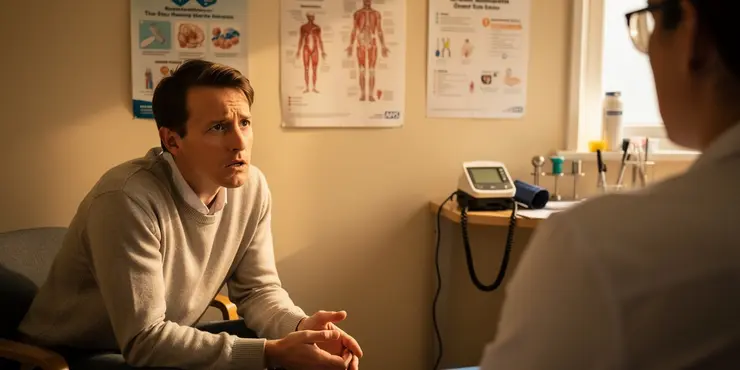
Worried about signs that could be cancer? Contact your GP practice | NHS
Relevance: 100%
-
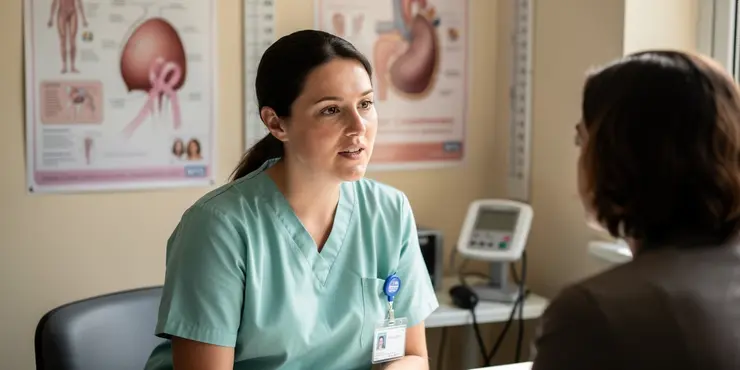
About Breast cancer - signs and symptoms | NHS
Relevance: 76%
-
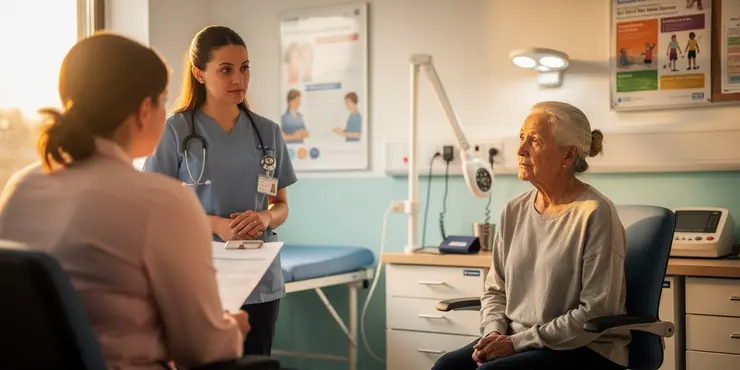
Bowel cancer - Symptoms and signs to look out for
Relevance: 72%
-
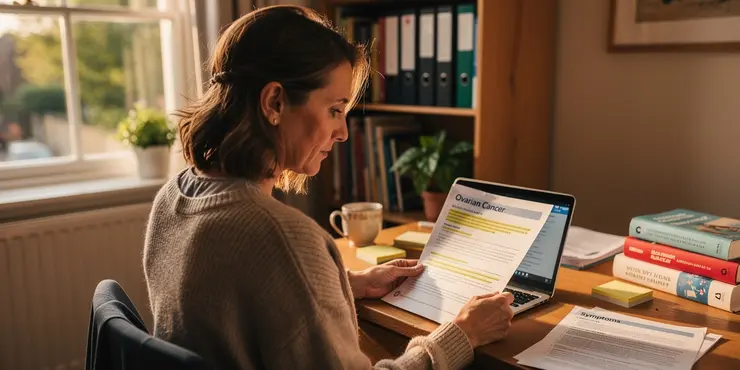
Ovarian cancer - signs and symptoms to look out for
Relevance: 70%
-
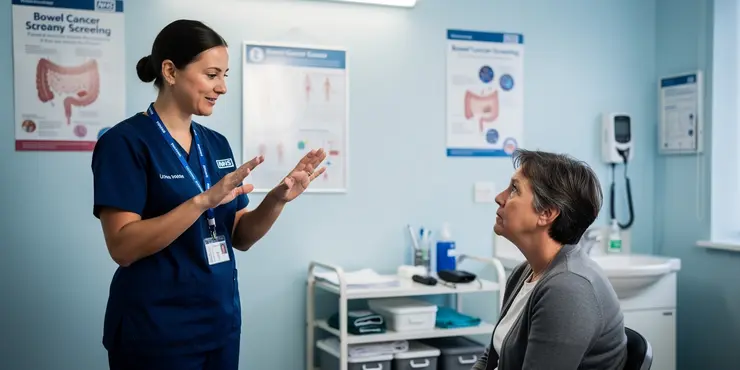
Learn about bowel cancer (British Sign Language version)
Relevance: 64%
-
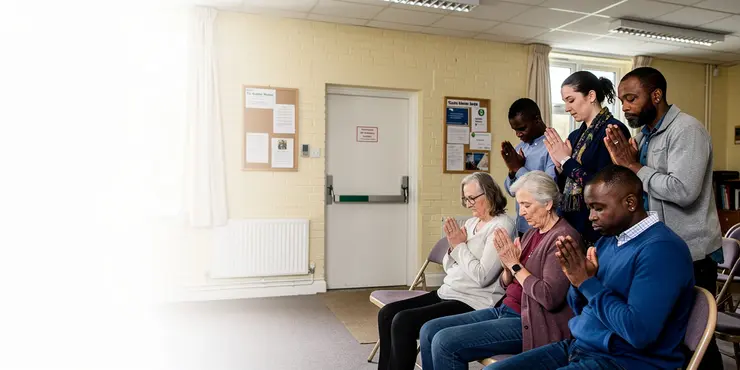
Can I practice my religion?
Relevance: 56%
-
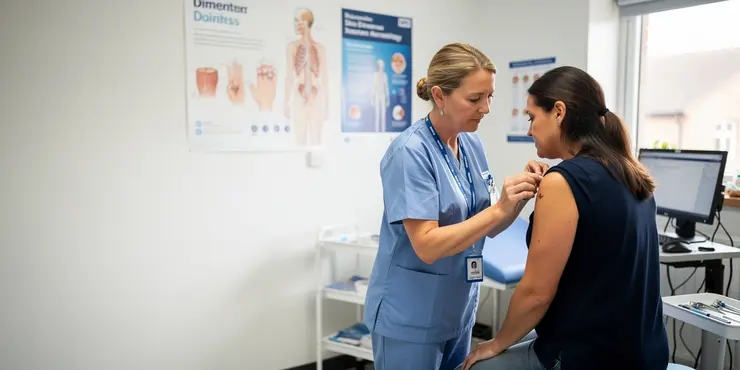
Skin Cancer - How do I check if my mole is skin cancer? | NHS
Relevance: 56%
-
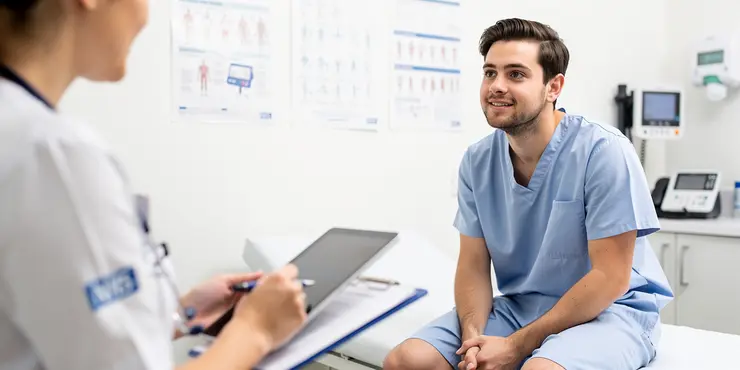
Is testicular cancer treatable?
Relevance: 55%
-
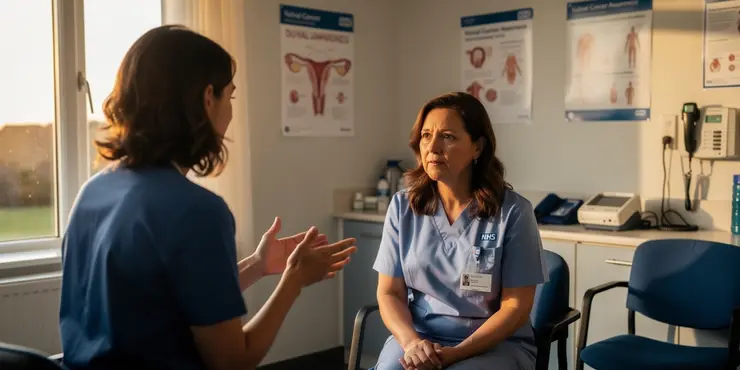
Vulval Cancer
Relevance: 55%
-
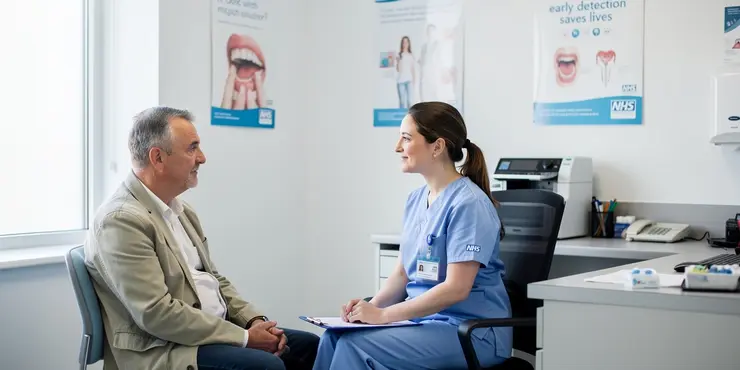
Mouth Cancer Awareness
Relevance: 52%
-
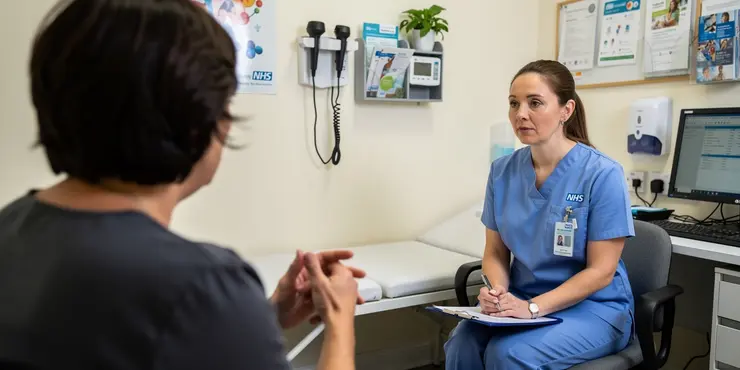
Is honour based abuse a cultural practice?
Relevance: 51%
-
Leukaemia: What are the signs and symptoms? | NHS
Relevance: 50%
-
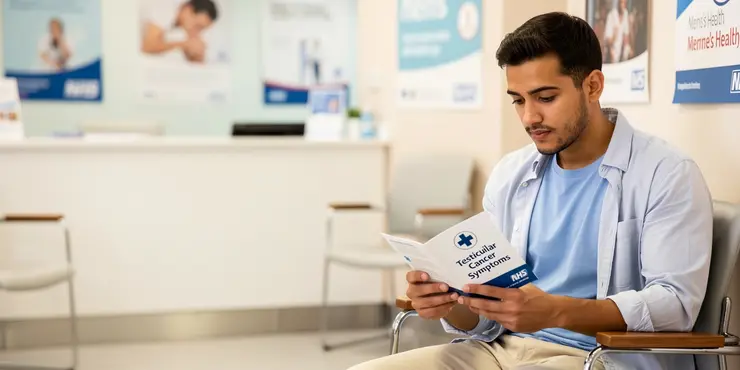
What are the symptoms of testicular cancer?
Relevance: 50%
-
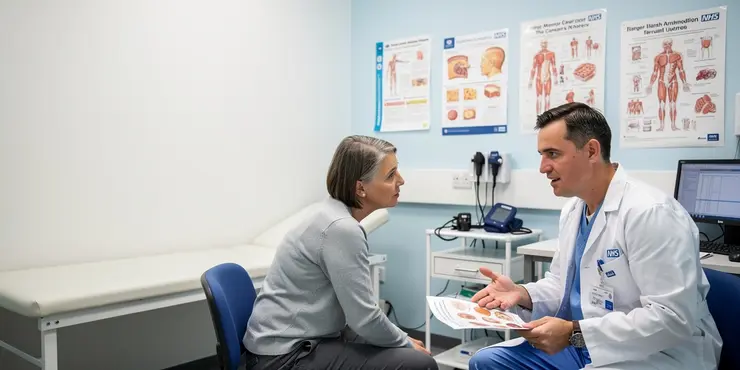
Skin cancer education
Relevance: 50%
-
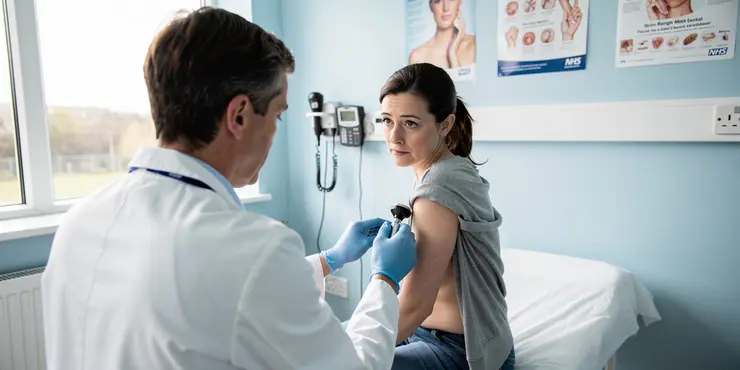
What is a skin cancer screening?
Relevance: 49%
-
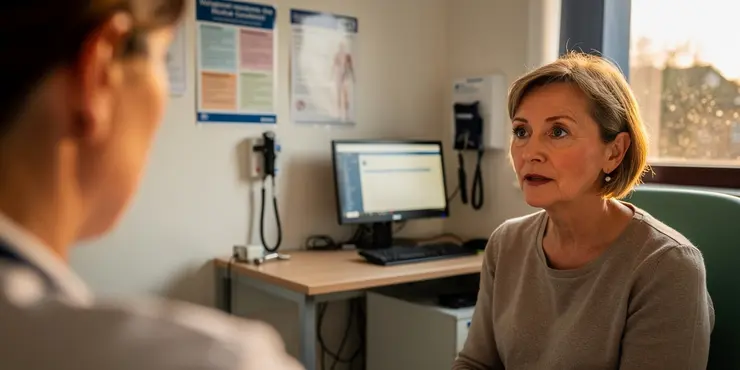
Vaginal Cancer
Relevance: 49%
-
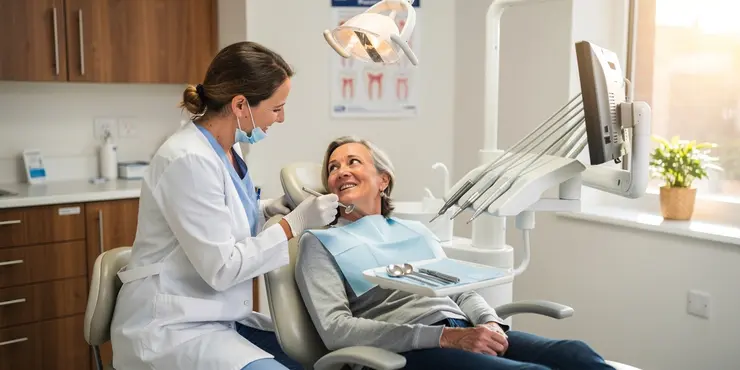
Mouth Cancer Infomercial
Relevance: 48%
-
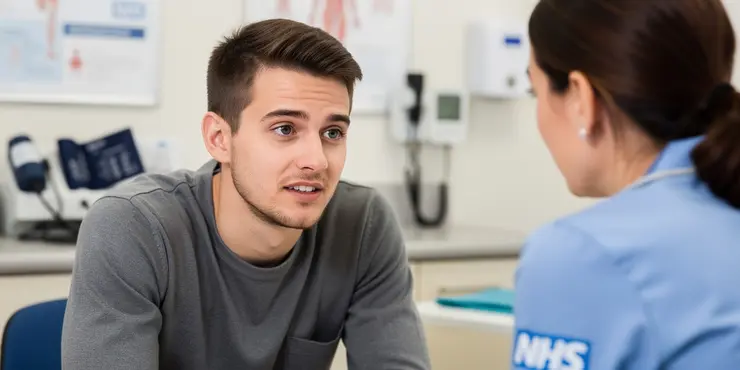
Can testicular cancer recur after treatment?
Relevance: 48%
-
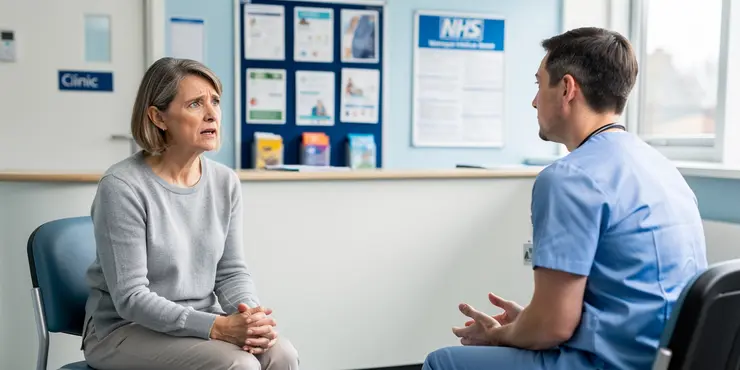
Had a cough for three weeks or more? It could be a warning sign | NHS
Relevance: 48%
-
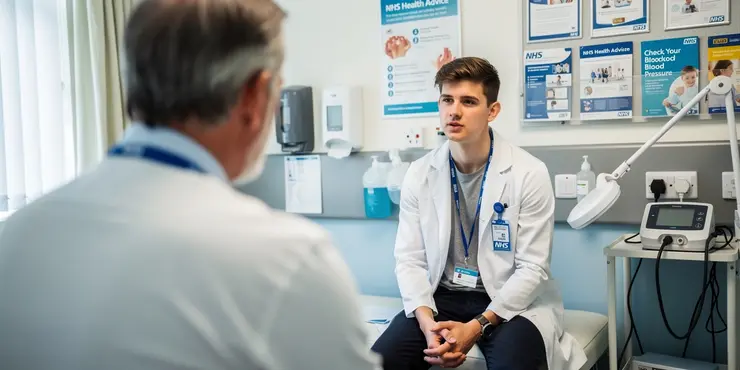
What is testicular cancer?
Relevance: 48%
-
What should I do if my NHS dentist's practice closes?
Relevance: 48%
-
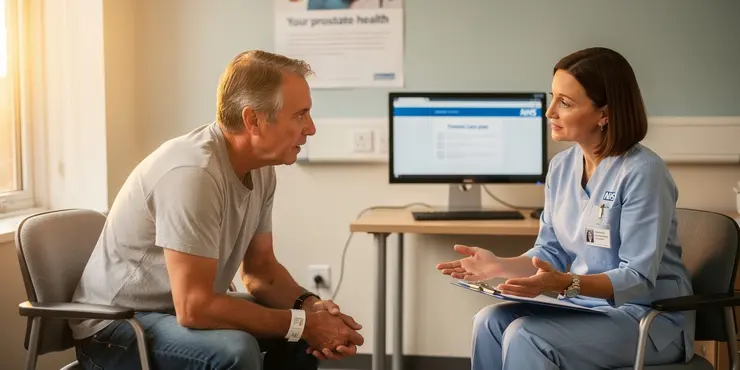
Treating prostate cancer
Relevance: 47%
-
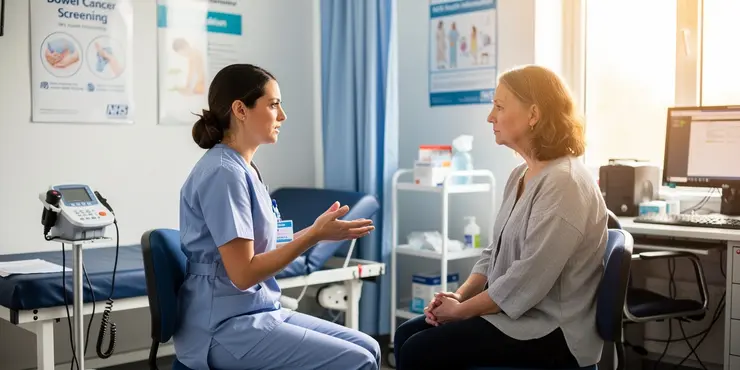
What kinds of cancer screening are available?
Relevance: 47%
-
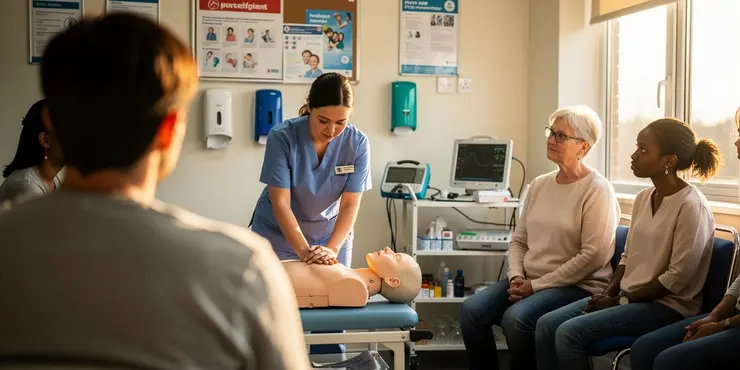
How can I practice first aid skills effectively?
Relevance: 47%
-
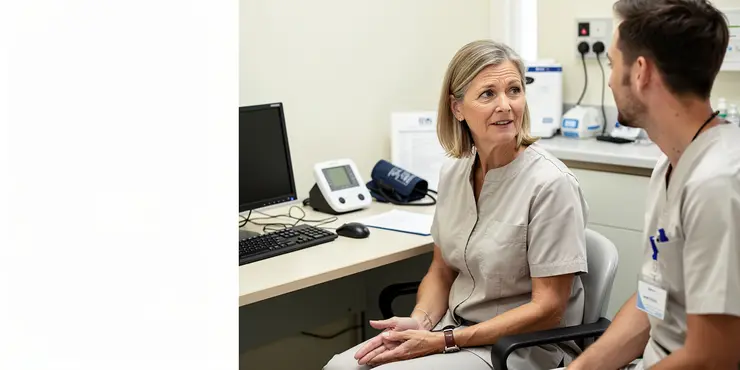
Ovarian Cancer
Relevance: 47%
-
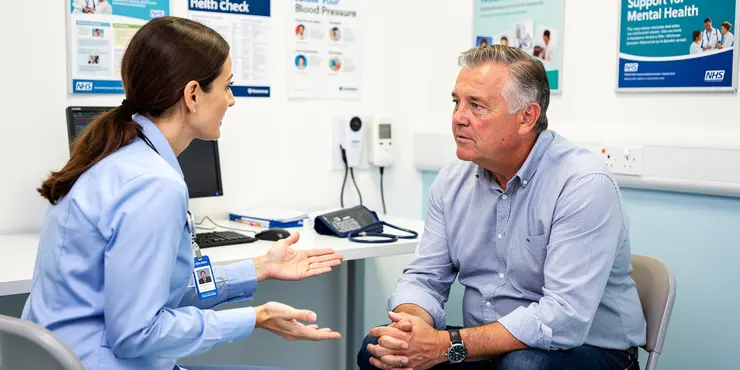
Living with prostate cancer
Relevance: 47%
-
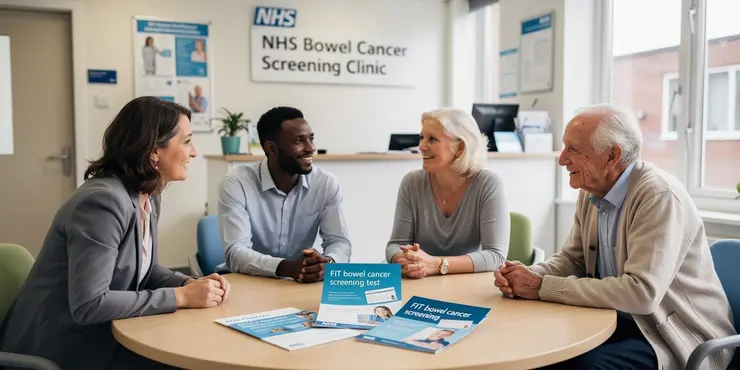
How to do the FIT bowel cancer screening test | Cancer Research UK
Relevance: 46%
-
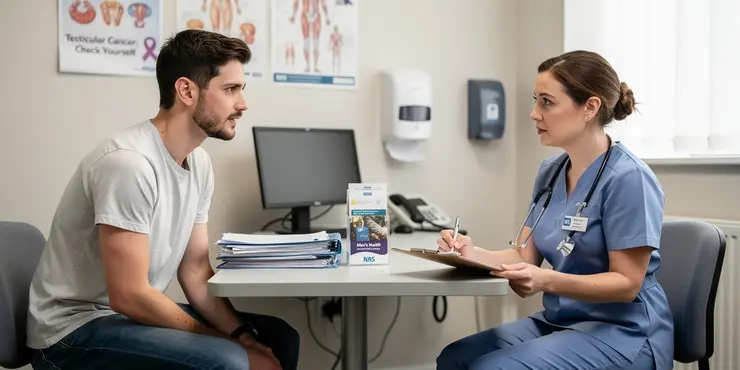
How common is testicular cancer?
Relevance: 46%
-
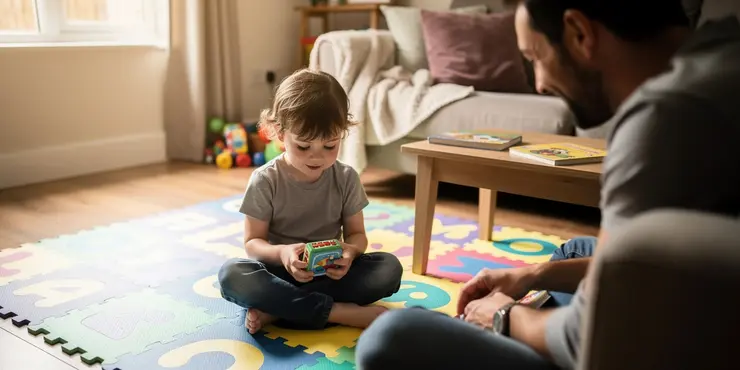
What are the signs of autism?
Relevance: 46%
-
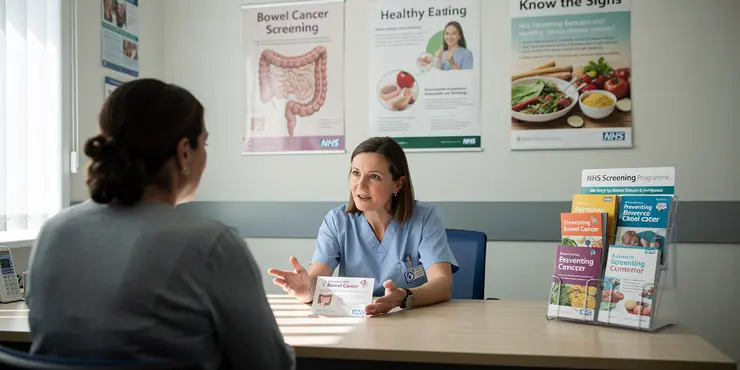
Can bowel cancer be prevented?
Relevance: 46%
-
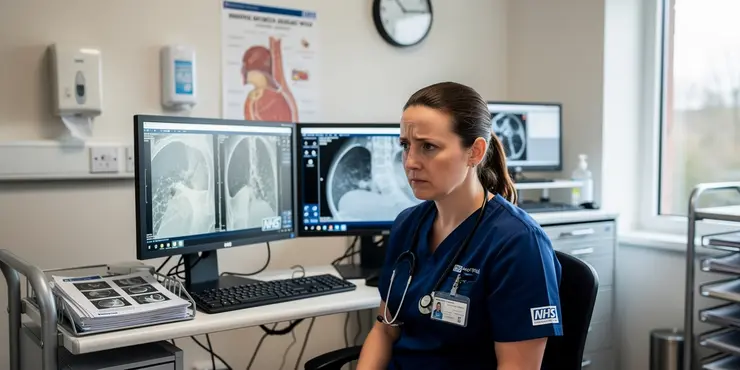
AI Breast Cancer Screening in the UK
Relevance: 46%
-
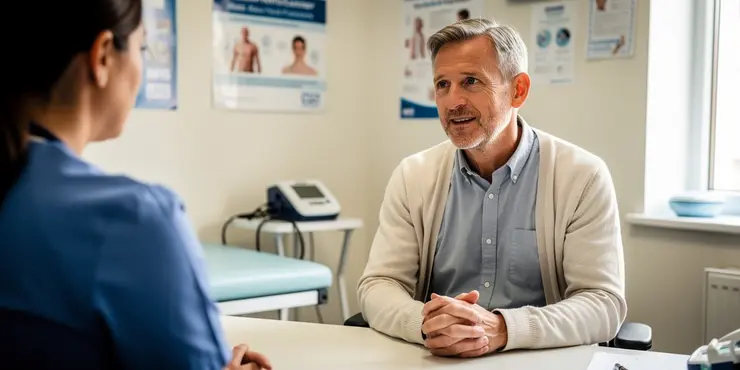
Prostate cancer symptoms - detecting them early
Relevance: 45%
-
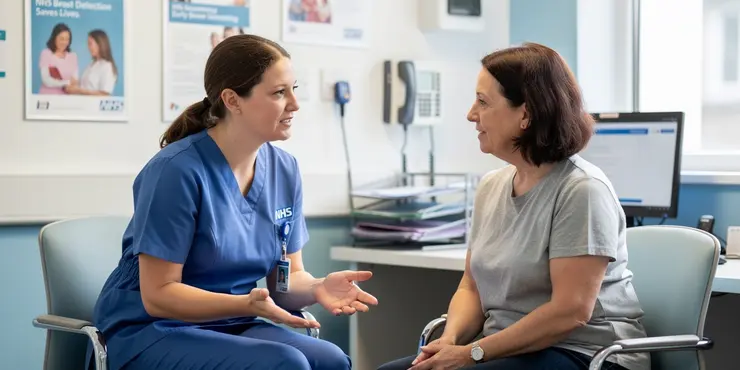
Breast cancer: testing and treatment | NHS
Relevance: 45%
-
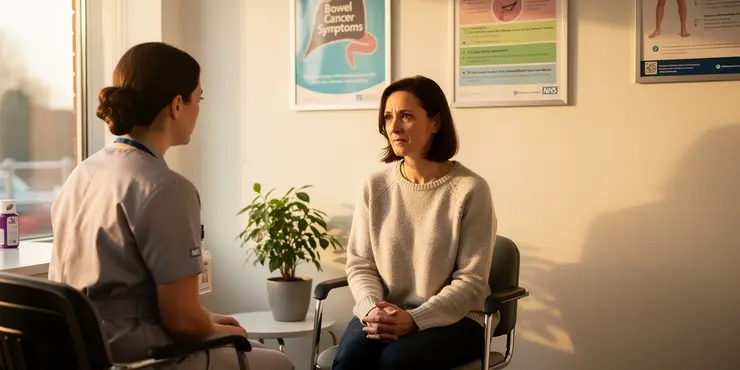
What is Bowel Cancer?
Relevance: 45%
-
Are there risks associated with home colorectal cancer tests?
Relevance: 45%
-
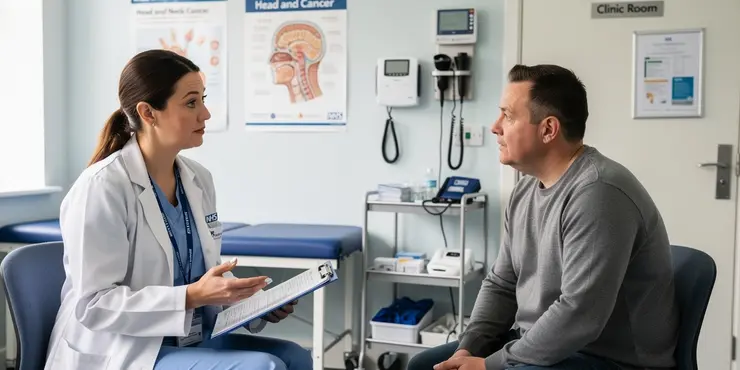
Head and Neck Cancer Diagnosis
Relevance: 45%
-
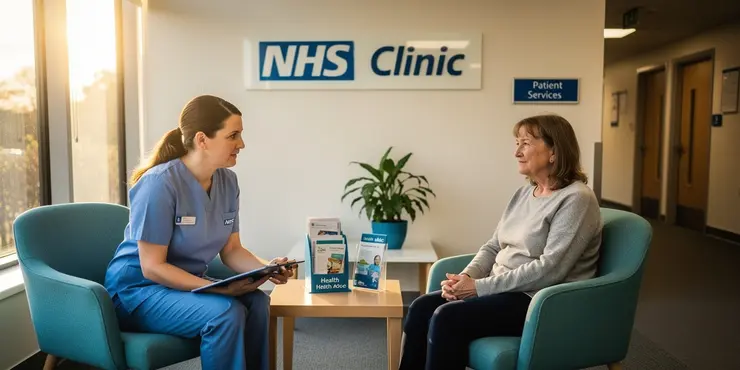
What is Cancer?
Relevance: 45%
-
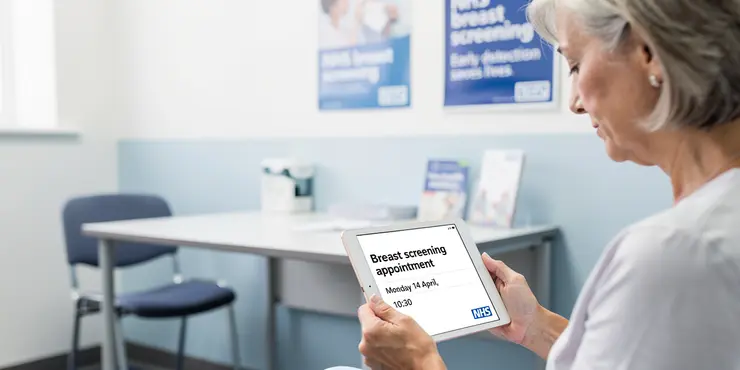
How often should I get screened for breast cancer?
Relevance: 45%
-
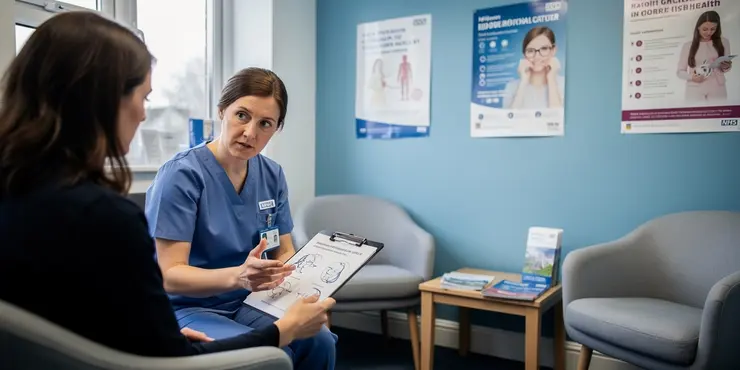
Endometrial Cancer
Relevance: 45%
-
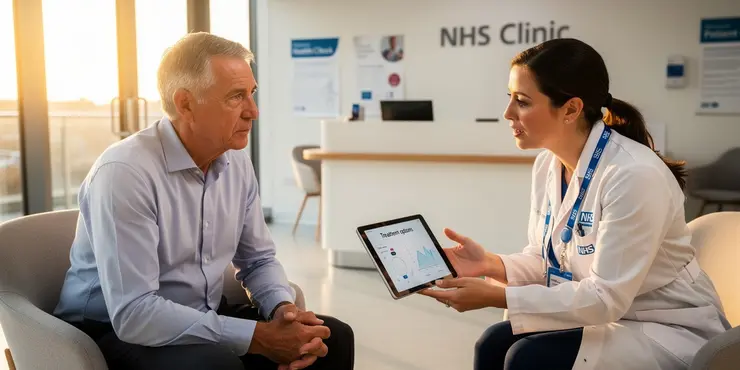
How is prostate cancer treated?
Relevance: 45%
What to do if you are worried about signs that may be cancer?
If you are worried about signs or symptoms that may be indicative of cancer, it's important to take proactive steps to address your concerns. Here's what you can do:
- Consult a Healthcare Professional: Schedule an appointment with your primary care physician or healthcare provider to discuss your symptoms. They can perform a thorough evaluation, review your medical history, and conduct any necessary tests or screenings to determine the cause of your symptoms.
- Describe Your Symptoms: Be prepared to describe your symptoms in detail, including when they started, their severity, any factors that worsen or alleviate them, and any other relevant information. Providing clear and accurate information will help your healthcare provider make an accurate diagnosis.
- Ask Questions: Don't hesitate to ask questions or voice any concerns you may have during your appointment. Your healthcare provider is there to address your concerns, provide information, and offer guidance on the next steps.
- Follow Recommendations: Based on your symptoms and evaluation, your healthcare provider may recommend further testing, such as blood tests, imaging studies, or biopsies, to determine the cause of your symptoms. It's important to follow their recommendations and complete any necessary tests or procedures.
- Seek a Second Opinion: If you have concerns about your diagnosis or treatment plan, consider seeking a second opinion from another healthcare provider or specialist. A second opinion can provide additional perspective and help ensure that you receive the most appropriate care.
- Address Your Emotional Well-being: Dealing with concerns about cancer can be stressful and overwhelming. It's important to prioritize your emotional well-being by seeking support from friends, family members, or mental health professionals. Support groups, counseling, or therapy can provide valuable emotional support and coping strategies.
- Stay Informed: Educate yourself about the signs and symptoms of cancer, as well as risk factors, screening guidelines, and prevention strategies. Reliable sources of information include reputable medical websites, cancer organizations, and healthcare providers.
- Take Care of Yourself: Focus on maintaining a healthy lifestyle by eating a balanced diet, staying physically active, getting enough sleep, and managing stress. Taking care of yourself can help support your overall well-being and resilience during challenging times.
Remember that not all signs or symptoms are indicative of cancer, and many other medical conditions can cause similar symptoms. However, it's essential to take your concerns seriously and seek medical attention for proper evaluation and guidance. Early detection and timely intervention can significantly improve outcomes for many types of cancer.
Worried About Signs That Could Be Cancer? Contact Your GP Practice | NHS
Identifying Potential Cancer Symptoms
Recognising early signs of cancer can significantly improve outcomes. Some common symptoms to watch for include unexplained weight loss, persistent fatigue, lumps or swellings, changes in bowel or bladder habits, and unusual bleeding. If you notice any of these signs, it's crucial to get them checked by your GP as soon as possible.
When to Seek Medical Advice
Don't wait until symptoms become severe before seeking medical advice. Immediate attention to early warning signs can make a critical difference. Your GP can assess your symptoms, conduct necessary tests, and refer you to a specialist if needed. Remember, early detection is key to effective treatment.
How to Contact Your GP Practice
Contacting your GP practice is straightforward. You can book an appointment by calling your local surgery, using online booking systems, or even via a mobile app. Always make sure to provide detailed information about your symptoms to help your GP understand your concerns.
What to Expect During Your Appointment
During your appointment, your GP will ask about your medical history and symptoms. They may perform a physical examination or recommend tests such as blood tests, imaging scans, or biopsies. Based on the results, you might be referred to a specialist for further evaluation.
Support and Resources
The NHS provides a range of resources and support for individuals concerned about cancer. From informational leaflets and online resources to support groups and counseling services, there is plenty of help available. Speak to your GP about the options available to you.
Importance of Regular Screenings
Regular screenings, such as mammograms, cervical smears, and bowel cancer tests, are essential for early detection. Even if you feel healthy, these screenings can identify cancers before symptoms appear, greatly improving treatment success rates. Make sure to attend all recommended screenings.
Worried About Signs That Could Be Cancer? Contact Your GP Practice | NHS
Feeling worried about potential signs of cancer can be daunting. However, early detection and treatment are crucial in significantly improving your chances of a positive outcome. In the UK, the NHS provides comprehensive services to help those concerned about cancer symptoms. Read on to understand what you can do if you're worried about cancer.
Recognising Potential Symptoms
Understanding the early signs and symptoms of cancer can help you take timely action. Common symptoms may include unusual lumps or swelling, unexplained weight loss, persistent coughs or hoarseness, changes in bowel habits, unusual bleeding, or changes in a mole. Remember that having one or more of these symptoms does not necessarily mean you have cancer, but it's important to have them checked by a healthcare professional.
Contacting Your GP Practice
If you're concerned about any symptoms, don't hesitate to contact your GP practice. In the UK, GP practices are your first point of contact for health concerns and can provide referrals to specialists if necessary. Most GP practices offer an appointment system, and many now also provide services such as phone consultations or online consultations, making it easier to discuss your symptoms with a doctor.
What to Expect During Your GP Appointment
During your appointment, your GP will likely ask you about your symptoms, any relevant personal or family medical history, and your lifestyle. They may perform a physical examination or refer you for further tests if needed. It's helpful to prepare for your appointment by noting down your symptoms, how long you've had them, and any other concerns you may have.
Further Tests and Referrals
If your GP believes further investigation is needed, they may refer you to a specialist or for tests such as blood tests, scans, or biopsies. The NHS aims to ensure these referrals are handled swiftly to provide peace of mind and, if necessary, begin treatment promptly. Remember, early detection plays a vital role in cancer treatment success.
Stay Proactive About Your Health
It's important to stay proactive about your health. Regular check-ups and being aware of any changes in your body can make a significant difference. The NHS offers various screening programs for different types of cancer, such as breast, cervical, and bowel cancer. Participating in these programs can help detect issues earlier.
By contacting your GP practice and taking the necessary steps, you play a crucial role in managing your health effectively. Don't hesitate to reach out if you're concerned about potential cancer signs.
Worried About Signs That Could Be Cancer? Contact Your GP Practice | NHS
Cancer is a major health concern, and early detection can significantly improve outcomes. It's important to be vigilant about changes in your body and seek medical advice if you notice anything unusual. In the UK, the NHS provides comprehensive support and guidance for individuals who suspect they might be experiencing cancer symptoms. Reaching out to your GP is a crucial first step in addressing these concerns.
Recognizing Potential Cancer Symptoms
Being aware of potential cancer symptoms can make a significant difference in early detection. Common signs include unexplained lumps, persistent coughs or hoarseness, changes in bowel or bladder habits, unexplained bleeding or bruising, and unexpected weight loss. Skin changes, such as new moles or changes in existing ones, can also be warning signs. If you notice any of these symptoms, it's essential to consult your GP for an evaluation.
Contacting Your GP Practice
If you’re concerned about possible cancer symptoms, it's important to not delay in seeking medical advice from your GP practice. In the UK, the NHS encourages patients to contact their General Practitioner (GP) without hesitation. They are equipped to assess your symptoms and, if necessary, refer you to a specialist for further investigation. Early contact with your GP can lead to earlier diagnosis and better treatment options.
NHS Support and Resources
The NHS offers a wealth of resources for individuals concerned about cancer. NHS websites provide reliable information on symptoms, treatment options, and patient support. Many GP practices also offer telephone consultations and virtual appointments, making it easier than ever to access medical advice. Additionally, trusted organizations such as Cancer Research UK and Macmillan Cancer Support provide valuable resources for educating yourself about cancer risks and prevention.
The Importance of Early Detection
Early detection of cancer often means more effective treatment and a greater chance of recovery. Regular check-ups and awareness of your body can play a crucial role in identifying cancer at an early, more treatable stage. In the UK, established screening programs for cervical, breast, and bowel cancer help detect issues before symptoms even arise, emphasizing the importance of regular participation in these programs.
Proactive health management can alleviate worries you may have about cancer. By staying informed and consulting with your GP on any health changes, you are taking significant steps towards safeguarding your health. The NHS is committed to providing the necessary support to help you through any health concerns.
What to do if you are worried about signs that may be cancer?
If you think you might have signs of cancer, it's important to do something about it. Here's what you can do:
- Talk to a Doctor: Make an appointment with your doctor. Tell them about your symptoms. They can check your health, ask questions about your past health problems, and do tests to find out what's wrong.
- Explain Your Symptoms: Tell the doctor what your symptoms are. Say when they started, how bad they are, and what makes them better or worse. This helps the doctor understand what might be happening.
- Ask Questions: Don't be afraid to ask your doctor questions. They are there to help you. Ask about your symptoms and what will happen next.
- Follow Doctor's Advice: The doctor might suggest more tests to find out what's wrong. These could include blood tests or scans. It's important to do what the doctor says and go for these tests.
- Get Another Opinion: If you are not sure about what the doctor says, you can ask another doctor. This is called getting a second opinion. It can help you feel more sure about what to do next.
- Take Care of Your Feelings: Worrying about cancer can be scary. Talk to friends or family about how you feel. You can also talk to a counselor or join a support group to help you cope.
- Learn About Cancer: Find out more about cancer signs and how to prevent it. You can use reliable websites or talk to healthcare professionals for information.
- Look After Yourself: Eat healthy food, exercise, sleep well, and keep stress low. Taking care of your body can help you feel better.
Remember, not all signs mean you have cancer. Other conditions can cause similar symptoms. But it's important to see a doctor to check. Finding out early can make a big difference.
Worried About Signs That Could Be Cancer? Contact Your GP Practice | NHS
Know the Signs of Cancer
Knowing the early signs of cancer can help. Look out for losing weight without trying, feeling very tired all the time, finding any lumps on your body, changes in using the toilet, and unusual bleeding. If you see any of these signs, tell your GP as soon as you can.
When to See a Doctor
Do not wait for symptoms to get worse before seeing a doctor. Acting quickly can help. Your GP will listen to your symptoms, do tests if needed, and might send you to another doctor. Finding cancer early makes it easier to treat.
How to Contact Your GP
It is easy to get in touch with your GP. You can call your local doctor’s office, use a website, or a phone app to book an appointment. Tell your GP clearly about your symptoms to help them know what you need.
What Happens at the Doctor’s Appointment
At the appointment, the GP will ask about your health and symptoms. They might do a check-up or ask for tests like blood tests or scans. Depending on the results, they might send you to a specialist doctor.
Help and Resources
The NHS offers a lot of help if you are worried about cancer. You can find leaflets, websites, support groups, and talk to a counselor. Ask your GP about what is available for you.
Why Regular Screenings Are Important
Regular health checks, like breast checks or tests for cervical and bowel cancer, are important to catch cancer early. These tests can find cancer before you have any signs. This makes treatment work better. Always go to your screenings when invited.
Worried About Signs That Could Be Cancer? Contact Your Doctor | NHS
Feeling scared about signs of cancer can be hard. But finding out early and getting help can really improve your chances of getting better. In the UK, the NHS can help if you worry about cancer signs. Read more to learn what you can do if you're worried.
Knowing the Signs
Knowing the signs of cancer can help you act quickly. Some signs might be lumps, weight loss you can't explain, a cough that won't go away, or changes in your toilet habits. It might also be changes in a mole or bleeding that’s not normal for you. Just because you have these signs doesn't mean you have cancer. But it’s important to let a doctor check you.
Contacting Your Doctor
If you're worried about any signs, talk to your doctor. In the UK, your doctor is the first person you go to with health worries. They can send you to see a specialist if you need to. You can talk to them by going to see them, on the phone, or online. This makes it easier to talk about how you feel.
What Happens When You See Your Doctor
When you see your doctor, they will ask about your signs, any sickness in your family, and how you live. They might check you over or send you for tests if needed. It's good to get ready for your visit by writing down what signs you have and how long you’ve had them.
More Tests and Visits to Specialists
If your doctor thinks you need more checks, they might send you to see a specialist or for tests like blood tests or scans. The NHS tries to do this quickly so you can feel less worried and start any treatment if you need it. Finding cancer early is very important for treatment to work well.
Take Care of Your Health
It's important to look after your health. Going for regular check-ups and noticing any changes in your body can help a lot. The NHS has check-ups for different cancers like breast, cervical, and bowel cancer. Going to these can help find problems early.
By talking to your doctor and taking steps to check on your health, you help take care of yourself. If you are worried about signs of cancer, don't wait to reach out to your doctor.
Worried About Signs That Could Be Cancer? Contact Your GP Practice | NHS
Cancer is a big health issue. Finding it early can help you get better treatment. It's important to watch for any changes in your body. If you see something unusual, talk to a doctor. In the UK, the NHS helps people who think they might have cancer. Seeing your GP (Family Doctor) is the first step if you are worried.
Recognizing Possible Cancer Symptoms
Knowing the signs of cancer can help find it early. Some common signs are lumps that don't go away, a cough that doesn't stop or a hoarse voice, changes in how you go to the toilet, bleeding or bruising you can't explain, and losing weight without trying. If you see changes in your skin or moles, these can also be signs. It's important to see your GP if you have these symptoms.
Contacting Your GP Practice
If you’re worried about cancer symptoms, see your GP soon. In the UK, the NHS wants you to contact your GP if you are worried. GPs can check your symptoms and send you to a specialist if needed. Getting in touch with your GP early can help you get the right treatment faster.
NHS Support and Resources
The NHS gives lots of help if you're worried about cancer. NHS websites have good information on symptoms and treatments. Many GP practices can talk to you on the phone or by video too. Trusted groups like Cancer Research UK and Macmillan Cancer Support also give helpful information about cancer. They can teach you about cancer risks and how to prevent it.
The Importance of Early Detection
Finding cancer early can mean better treatment and better chances of getting better. Regular check-ups and knowing your body can help find cancer before it gets worse. In the UK, there are screening programs for cervical, breast, and bowel cancer. These programs help find problems even before you notice any symptoms. This shows how important it is to join these programs.
Taking care of your health can help with worries about cancer. By staying informed and seeing your GP about any changes, you are doing a lot to stay healthy. The NHS is here to support you with any health worries you have.
Frequently Asked Questions
What are common signs and symptoms of cancer?
Common signs and symptoms include unexplained lumps or swelling, unexplained weight loss, changes in bowel habits, unusual bleeding, persistent cough, changes in skin moles, or difficulty swallowing.
When should I contact my GP about cancer symptoms?
You should contact your GP if you notice any unusual or persistent changes in your body, such as lumps, unexplained bleeding, or prolonged cough lasting more than three weeks.
How can I book an appointment with my GP if I'm worried about cancer symptoms?
You can book an appointment with your GP by calling your local practice, using their online appointment booking system, or using the NHS app.
Can lifestyle changes reduce my risk of cancer?
Yes, healthy lifestyle choices such as quitting smoking, maintaining a healthy weight, eating a balanced diet, and regular physical activity can reduce your risk of developing cancer.
What screenings are available for cancer in the UK?
The NHS offers screening for several types of cancer, including breast, cervical, and bowel cancer. These screenings are designed to detect cancer early and improve outcomes.
Are cancer symptoms the same for everyone?
No, cancer symptoms can vary depending on the type and location of the cancer, as well as the individual. It's important to discuss any unusual symptoms with your GP.
Can my GP conduct cancer tests?
Your GP can perform an initial examination and may refer you for further tests or to a specialist if cancer is suspected.
Is there support available if I'm diagnosed with cancer?
Yes, there are numerous resources and support groups available, including Macmillan Cancer Support and Cancer Research UK, where you can access information and support services.
Are all lumps cancerous?
Not all lumps are cancerous. Many are benign, but it’s important to have any new or unusual lumps checked by your GP to rule out cancer.
How can I reduce my cancer risk if I have a family history?
If you have a family history of cancer, it's important to discuss this with your GP, who may suggest genetic counseling and specific lifestyle changes to reduce your risk.
Does cancer treatment always involve chemotherapy?
Not always. Treatment depends on the type and stage of cancer and may include surgery, radiation therapy, immunotherapy, and other targeted therapies in addition to, or instead of, chemotherapy.
Are there early detection tests for all types of cancer?
No, early detection tests are not available for all types of cancer. However, staying aware of symptoms and visiting your GP regularly for check-ups can help with early detection.
Is cancer diagnosis and treatment covered by the NHS?
Yes, cancer diagnosis and treatment are covered by the NHS, although some treatments may require approval or referral depending on the local guidelines.
What should I do if I'm worried about a mole changing?
If you notice a mole that has changed in size, shape, or color, or if it becomes itchy or bleeds, contact your GP for a skin assessment.
Can young people get cancer?
While cancer is more common in older adults, it can occur at any age. If you have concerning symptoms, it’s important to discuss them with your GP regardless of your age.
What are signs of cancer?
Cancer can have signs (clues) that something is wrong. These are things you can see or feel in your body.
Here are some signs to look for:
- A lump (a bump) in your body that is new or growing.
- Unusual bleeding or bruising.
- Changes in your skin, like a new spot or a sore that doesn't heal.
- Coughing that doesn't go away or problems breathing.
- Losing weight without trying.
- Feeling tired all the time.
If you or someone you know notices these signs, it's important to talk to a doctor. They can help find out what's going on.
Helpful tools:
- Ask someone you trust to go with you to the doctor.
- Write down any signs you have before you see the doctor.
- Use pictures to explain how you feel.
Here are things to look out for:
- Lumps or swelling that you don’t know where they came from.
- Losing weight without trying.
- Your bathroom habits change, like going more or less.
- Bleeding when you don’t expect it.
- A cough that won’t go away.
- Skin moles that look different.
- Having trouble swallowing food.
If you notice these things, it's important to tell an adult or visit a doctor.
When should I talk to my doctor about signs of cancer?
If you notice anything different about your body and you feel worried, it is important to talk to your doctor.
Here are some signs to watch out for:
- Lumps or bumps that you can feel or see.
- Changes in your skin, like new spots or moles that look different.
- Bleeding or bruises that do not go away.
- Feeling very tired all the time.
- Any change in your body that does not feel normal.
Remember, only a doctor can tell if something is serious or not. It is always okay to ask for help.
If you need help talking to the doctor, you can:
- Bring a friend or family member with you.
- Write down your questions before you go.
- Ask the doctor to explain things in a simple way.
If you see any changes in your body that don't go away, talk to your doctor. Look out for things like bumps, bleeding that you can't explain, or a cough that lasts longer than three weeks.
How can I make a doctor appointment if I'm worried about cancer signs?
If you are worried about signs that might be cancer, you can see your doctor. Here is how you can book a time to see your doctor:
- Call the doctor's office to book a time.
- Visit the doctor's office and ask to book a time.
- Check if you can book a time online on the doctor's website.
If you need help, you can ask a family member or friend. They can help you call or use the computer. You can also ask the doctor's office if they have someone who can help you book an appointment.
You can make a doctor's appointment by:
- Calling your local doctor’s office.
- Going online to book an appointment.
- Using the NHS app on your phone or tablet.
Can changing how I live help stop cancer?
Changing some things in your life might help you stay healthy and lower the chance of getting cancer. Here are some ideas:
- Eat lots of fruits and vegetables to keep your body strong.
- Try to exercise every day. Even a little bit helps!
- Avoid smoking and stay away from smoke.
- Limit sugary drinks and junk food.
- Protect your skin from the sun by wearing hats and sunscreen.
If you find reading difficult, try using tools that read out loud to you or highlight words. You can also ask a friend or family member to explain things to you.
Yes, you can make healthy choices to help stop cancer. Stop smoking, keep a healthy weight, eat good foods, and exercise often. These things can help you stay healthy.
What tests can find cancer early in the UK?
The NHS helps find cancer early. They check for three types: breast cancer, cervical cancer, and bowel cancer. Finding cancer early can help you get better.
Do all people have the same signs of cancer?
No, signs of cancer can be different. It depends on where the cancer is and the type. It also depends on the person. Talk to your doctor if something does not feel right.
Can my doctor do cancer tests?
Your doctor can check you and might send you for more tests or to see a special doctor if they think you might have cancer.
Can I get help if I find out I have cancer?
If you find out you have cancer, you can get help. There are people and places that can support you. Here are some ways to get help:
- Doctors and Nurses: They can give you medicine and help you feel better.
- Family and Friends: You can talk to them and share your feelings.
- Support Groups: You can meet other people with cancer and talk about what you are going through.
- Counselors: They can help you talk about your fears and feel less worried.
You can also use helpful tools:
- Picture Books: Books with pictures that explain cancer in simple words.
- Apps: There are phone apps that help you remember your medicine and appointments.
Remember, you are not alone, and there are people who can help you feel better.
Yes, there are many places that can help. You can try Macmillan Cancer Support and Cancer Research UK. They have information and people who can help you.
Do all lumps mean cancer?
Not all lumps mean you have cancer. Many lumps are not dangerous. But it’s important to show any new or strange lumps to your doctor. This way, they can make sure it’s not cancer.
How can I lower my chance of getting cancer if it runs in my family?
Having family members with cancer can be worrying, but there are ways to help keep yourself healthy. Here are some simple things you can do:
- Eat healthy foods: Try to eat more fruits and vegetables. They help keep your body strong and healthy.
- Exercise regularly: Moving your body is good for you. Try to be active every day, like walking or playing outside.
- Don’t smoke: Smoking is very bad for your health. If you smoke, ask for help to stop.
- Limit alcohol: Drinking too much alcohol is not good for your health. Try to drink less.
- See your doctor: Regular doctor visits can help find any problems early.
These steps can help you stay healthy. You can also talk to your doctor for more advice.
Using tools like picture cards or apps can also help you remember these tips.
If someone in your family has had cancer, you should talk to your doctor. Your doctor can help you understand if you might get cancer too. They might tell you to see a special doctor who understands family history of illnesses. Your doctor might also give you advice on how to live healthy to lower your risk of getting cancer.
Do you always need chemotherapy to treat cancer?
Not always. There are different ways to treat cancer. Some people need chemotherapy, but not everyone. Doctors might use surgery or radiation instead. It depends on the type of cancer and what the doctor thinks is best.
Tools like pictures or videos can help explain cancer treatments. You can also ask someone you trust to explain it to you in simple words.
No, not always. How we treat cancer depends on the kind of cancer and how much it has spread. We might use surgery to take it out, or use strong lights (radiation therapy) to kill it. There are also special medicines that help the body fight cancer (immunotherapy) or other focused treatments. Sometimes, doctors use these instead of, or with, chemotherapy.
Can all kinds of cancer be found early with tests?
Doctors have special tests to find some cancers early.
But not all cancers have early tests.
It is important to see a doctor if you feel unwell.
Going for regular check-ups can help, too.
Asking family or friends to come with you to the doctor can make it easier. They can help you understand what the doctor says.
You can also write down questions so you don’t forget.
No, we can't find all cancers early with tests. But you can still help by looking out for signs and going to the doctor often.
Does the NHS pay for finding and treating cancer?
Yes, the NHS helps you if you have cancer. They pay for tests to find cancer and for treatment to help you get better.
If you find reading hard, ask someone you trust for help. You can also use tools like audiobooks to listen to the information instead.
Yes, the NHS helps if you have cancer. They will see if you have cancer and give you medicine or treatment. Sometimes, you need special permission for certain treatments. This depends on where you live.
What to do if you are worried about a mole changing?
If you notice a mole on your skin is changing, don't worry, but tell a grown-up. Here is what you can do:
- Ask an adult to look at it with you.
- Visit a doctor to check the mole.
The doctor knows how to help. It is always good to check!
Using a calendar can help you remember when you first noticed the change. Taking a picture can also be useful to show the doctor.
Ask for help if you find reading or writing hard. A family member, carer, or friend can help you. Speaking out loud and listening can make it easier.
If you see a mole on your skin that looks different, like it's bigger, a different shape, or a new color, or if it feels itchy or starts to bleed, tell your doctor. They can check it for you.
Can kids and teenagers get cancer?
Cancer is when some bad cells in the body grow and don't stop. It can happen to anyone, even kids and teenagers. But it is not very common in young people.
If you have questions or worries about cancer, it's good to talk to a doctor or a nurse. They can give you the best help and answers.
Using a calendar or making a journal can be a helpful way to keep track of doctor visits and how you're feeling. Reading books for kids about health might also help you understand more.
Cancer is usually found in older people, but it can happen to anyone, even young people. If you feel unwell and are worried, it's important to talk to your doctor, no matter how old you are.
Useful Links
This website offers general information and is not a substitute for professional advice.
Always seek guidance from qualified professionals.
If you have any medical concerns or need urgent help, contact a healthcare professional or emergency services immediately.
Some of this content was generated with AI assistance. We’ve done our best to keep it accurate, helpful, and human-friendly.
- Ergsy carfully checks the information in the videos we provide here.
- Videos shown by Youtube after a video has completed, have NOT been reviewed by ERGSY.
- To view, click the arrow in centre of video.
- Most of the videos you find here will have subtitles and/or closed captions available.
- You may need to turn these on, and choose your preferred language.
- Go to the video you'd like to watch.
- If closed captions (CC) are available, settings will be visible on the bottom right of the video player.
- To turn on Captions, click settings .
- To turn off Captions, click settings again.
More Items From Ergsy search
-

Worried about signs that could be cancer? Contact your GP practice | NHS
Relevance: 100%
-

About Breast cancer - signs and symptoms | NHS
Relevance: 76%
-

Bowel cancer - Symptoms and signs to look out for
Relevance: 72%
-

Ovarian cancer - signs and symptoms to look out for
Relevance: 70%
-

Learn about bowel cancer (British Sign Language version)
Relevance: 64%
-

Can I practice my religion?
Relevance: 56%
-

Skin Cancer - How do I check if my mole is skin cancer? | NHS
Relevance: 56%
-

Is testicular cancer treatable?
Relevance: 55%
-

Vulval Cancer
Relevance: 55%
-

Mouth Cancer Awareness
Relevance: 52%
-

Is honour based abuse a cultural practice?
Relevance: 51%
-
Leukaemia: What are the signs and symptoms? | NHS
Relevance: 50%
-

What are the symptoms of testicular cancer?
Relevance: 50%
-

Skin cancer education
Relevance: 50%
-

What is a skin cancer screening?
Relevance: 49%
-

Vaginal Cancer
Relevance: 49%
-

Mouth Cancer Infomercial
Relevance: 48%
-

Can testicular cancer recur after treatment?
Relevance: 48%
-

Had a cough for three weeks or more? It could be a warning sign | NHS
Relevance: 48%
-

What is testicular cancer?
Relevance: 48%
-
What should I do if my NHS dentist's practice closes?
Relevance: 48%
-

Treating prostate cancer
Relevance: 47%
-

What kinds of cancer screening are available?
Relevance: 47%
-

How can I practice first aid skills effectively?
Relevance: 47%
-

Ovarian Cancer
Relevance: 47%
-

Living with prostate cancer
Relevance: 47%
-

How to do the FIT bowel cancer screening test | Cancer Research UK
Relevance: 46%
-

How common is testicular cancer?
Relevance: 46%
-

What are the signs of autism?
Relevance: 46%
-

Can bowel cancer be prevented?
Relevance: 46%
-

AI Breast Cancer Screening in the UK
Relevance: 46%
-

Prostate cancer symptoms - detecting them early
Relevance: 45%
-

Breast cancer: testing and treatment | NHS
Relevance: 45%
-

What is Bowel Cancer?
Relevance: 45%
-
Are there risks associated with home colorectal cancer tests?
Relevance: 45%
-

Head and Neck Cancer Diagnosis
Relevance: 45%
-

What is Cancer?
Relevance: 45%
-

How often should I get screened for breast cancer?
Relevance: 45%
-

Endometrial Cancer
Relevance: 45%
-

How is prostate cancer treated?
Relevance: 45%


